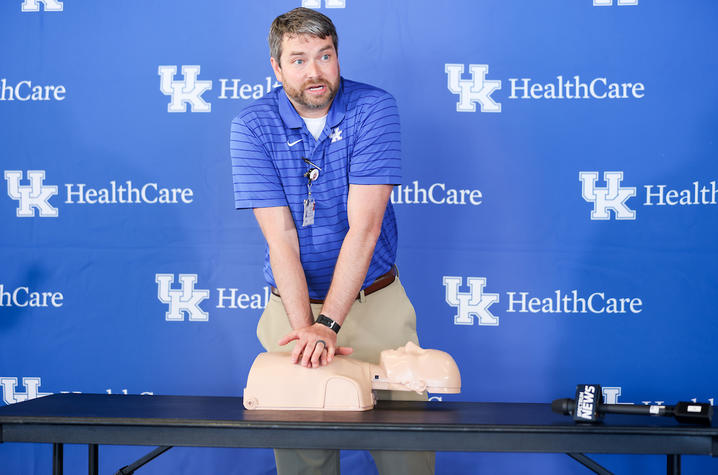2 Easy Steps to Save a Life

The University of Kentucky Public Relations amd Strategic Communications Office provides a weekly health column available for use and reprint by news media. This week's column is by Jacob Stone, director of cardiac rehab, UK HealthCare Gill Heart & Vascular Institute.
LEXINGTON, Ky. (June 22, 2021) — If you could learn a lifesaving skill in 90 seconds, would you? What if you knew 90 seconds could mean the difference between life and death?
Ninety seconds is all you need to learn hands-only CPR. In two simple steps, you have the power to save a life.
Heart disease is the leading cause of death in Kentucky, and the Commonwealth has one of the highest rates of heart disease in the country. For many people, heart disease leads to emergent, life-threatening situations, like cardiac arrest.
According to the American Heart Association, more than 350,000 out-of-hospital cardiac arrests happen in the United States each year, with about 70% happening in homes. When someone has cardiac arrest, the chance of survival goes down by 10% for every minute without CPR, so every second counts. The chances of survival double, or even triple, if they receive CPR.
If you witness a teen or adult in your home collapse, call 911 immediately. The dispatcher can help walk you through CPR. Next, place one hand on the top of the other and push hard and fast on the center of the victim’s chest until help arrives or the victim regains consciousness.
It is important to note that performing hands-only CPR on someone who is in cardiac arrest does not increase your risk of transmission of coronavirus. While hands-only CPR is an appropriate technique for adults, breaths are still important for infants and children.
Learn more about hands-only CPR here.
As the state’s flagship, land-grant institution, the University of Kentucky exists to advance the Commonwealth. We do that by preparing the next generation of leaders — placing students at the heart of everything we do — and transforming the lives of Kentuckians through education, research and creative work, service and health care. We pride ourselves on being a catalyst for breakthroughs and a force for healing, a place where ingenuity unfolds. It's all made possible by our people — visionaries, disruptors and pioneers — who make up 200 academic programs, a $476.5 million research and development enterprise and a world-class medical center, all on one campus.




